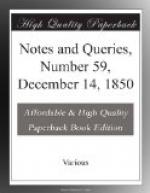H.G.T.
[Footnote 2: If the patient be a woman, the grave chosen must be that of the last young man buried, and that of the last young woman in the case of a man patient.]
Piskies.—An old woman, the wife of a respectable farmer at a place called “Colmans,” in the parish of Werrington, near Launceston, has frequently told my informant before-mentioned of a “piskey” (for so, and not pixy, the creature is called here, as well as in parts of Devon) which frequently made its appearance in the form of small child in the kitchen of the farm-house, where the inmates were accustomed to set a little stool for it. It would do a good deal of household work, but if the hearth and chimney corner were not kept neatly swept, it would pinch the maid. The piskey would often come into the kitchen and sit on its little stool before the fire, so that the old lady had many opportunities of seeing it. Indeed it was a familiar guest in the house for many months. At last it left the family under these circumstances. One evening it was sitting on the stool as usual, when it suddenly started, looked up, and said,—
“Piskey fine, and Piskey gay,
Now Piskey! run away!”
and vanished; after which it never appeared again. This distich is the first utterance of a piskey I have heard.
The word “fine” put me in mind of the expression “fine spirit,” “fine Ariel,” &c., noticed by DR. KENNEDY lately in NOTES AND QUERIES (Vol. ii., p. 251.). It is worth notice that the people here seem to entertain no doubt as to the identity of piskies and fairies. Indeed I am told, that the old woman before mentioned called her guest indifferently “piskey” or “fairy.”
The country people in this neighbourhood sometimes put a prayer-book under a child’s pillow as a charm to keep away the piskies. I am told that a poor woman near Launceston was fully persuaded that one of her children was taken away and a piskey substituted, the disaster being caused by the absence of the prayer-book on one particular night. This story reminds me of the “killcrop.”
H.G.T.
1. The dun cow of Dunsmore filled with milk every vessel that was brought to her till an envious witch tried to milk her in a sieve.
2. Lady Godiva.—A close-fitting dress might suggest the idea of nudity; but was not the horse borrowed from the warrior Lady of Mercia Ethelfleda?
3. CAN DU PLERA MELEOR CERA. Quand Dieu plaira meilleur sera. Charm on a ring, olim penes W. Hamper, F.A.S.
F.Q.
* * * * *
MINOR NOTES.
Circulation of the Blood.—About twenty-five years since, being in a public library in France, a learned physician pointed out to me in the works of the Venerable Bede a passage in which the fact of the circulation of the blood appeared to him and myself to be clearly stated. I regret that I did not, at the time, “make a note of it,” and that I cannot now refer to it, not having access to a copy of Bede: and I now mention it in hopes that some of your correspondents may think it worth while to make it a subject of research.




